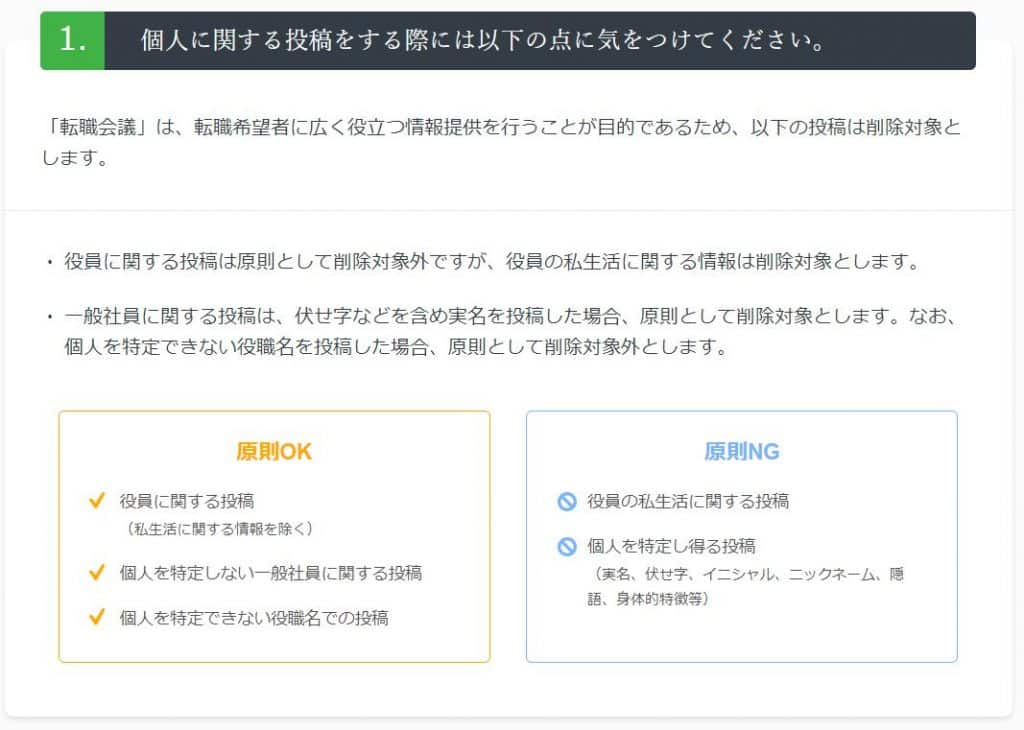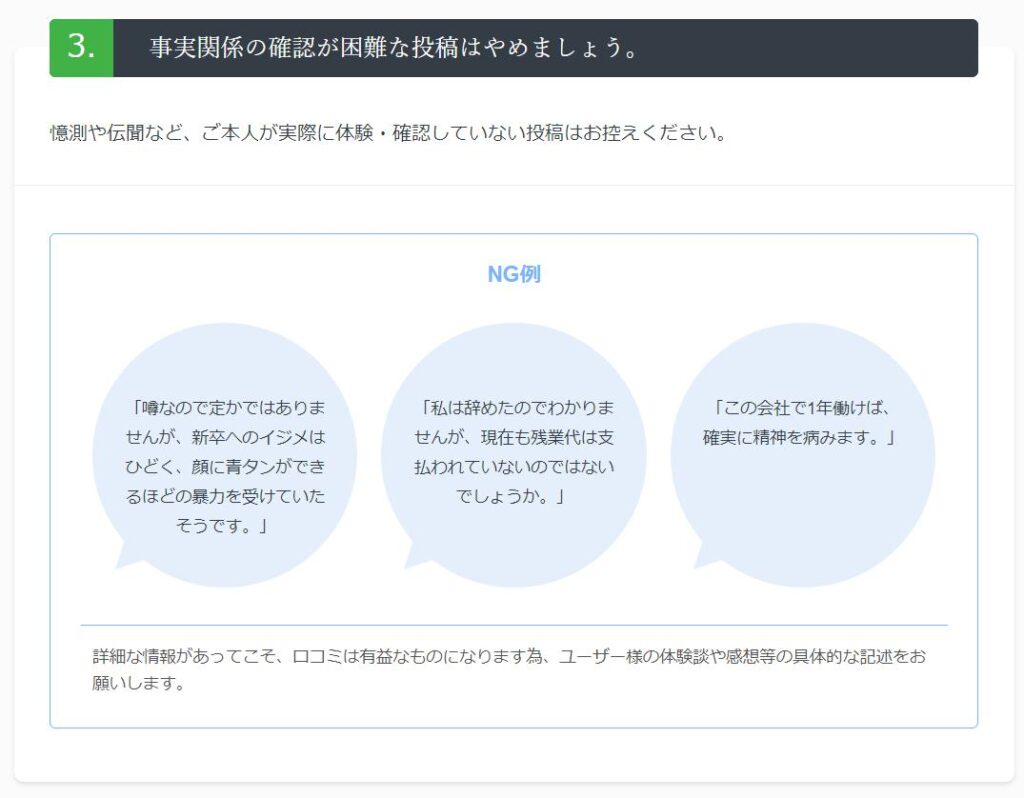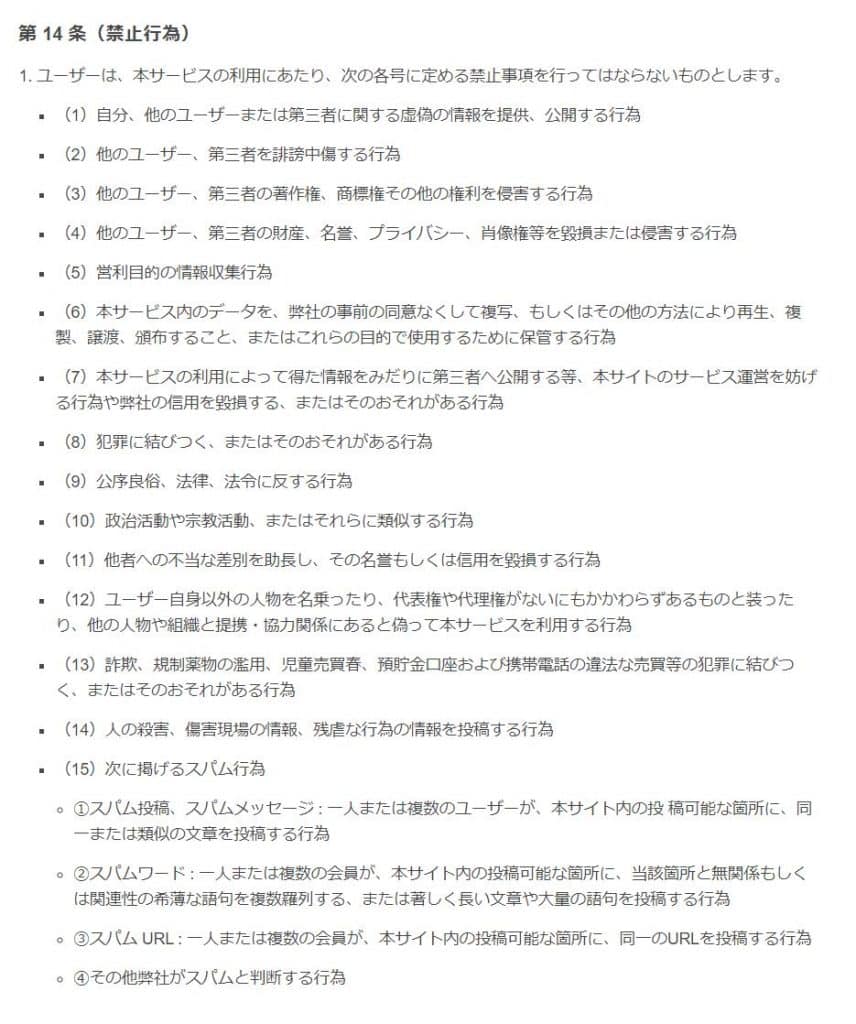What are the Methods for Deleting Reviews on Job Change Meetings and Measures Against Reputational Damage?

Job Change Conference has received over 3 million reviews on companies’ annual salaries, working environments, and more. Many people likely refer to these reviews when job hunting. However, there are also many negative posts about companies on Job Change Conference. Therefore, companies may be concerned about reputational damage leading to a decline in their reputation.
https://monolith.law/reputation/deletion-companies-bad-reputation-on-job-site[ja]
This article will explain the reputational damage caused by reviews on Job Change Conference and how to deal with it.
What is Job Change Conference?

At the Job Change Conference, you can view reviews related to specific companies on “annual income & evaluation”, “job satisfaction”, “skill improvement”, “welfare & system”, “growth & future prospects”, “employees & management”, “work-life balance”, “ease of work for women”, “gap after joining the company”, “reason for resignation”, “charm of the president”, and “interview & selection”. Since these reviews are posted by the company’s employees and ex-employees, they are very useful for those who want to know the real information when considering a job change. In addition to being a review site, it also functions as a job change site, with more than 100,000 job postings. The site is operated by “Livsense Inc.”. Membership registration (free) is required to post or view reviews.
What are the malicious reviews posted on Job Change Meetings?
Many of the people who post reviews on Job Change Meetings are former employees. Therefore, the content tends to be critical of the company. According to the Job Change Meetings review posting guidelines, even if the content is critical, it will be posted if it is a constructive post. In other words, even if the content is critical, if it is judged to be useful information for job change decisions, it will be posted. Viewers want to know real information from people who have worked at the company, so it can be said that it is inevitable to post negative content. However, not all reviews are posted. The review posting guidelines also specify the content of reviews that are subject to deletion, which we will introduce below.
Information about the private life of executives
Information about the private life of executives, such as “Executive ○○ spends his holidays playing golf” and “Executive △△ lives in a tower mansion in Musashi-Kosugi,” is subject to deletion. This is because such information is not useful for job seekers. However, posts about executives outside of their private lives are not a problem.
Posts that identify individuals
Posts about general employees are possible, but posts that can identify individuals are subject to deletion. Not only real names, but also pseudonyms, initials, nicknames, and physical personalityistics will be deleted if they can identify individuals. There is no problem if the content does not identify individuals, such as “There is an employee who harasses power”. Also, regarding the mention of job titles, if it does not identify individuals, it is not subject to deletion.

Defamatory expressions
Since the purpose is to provide objective information to job seekers, posts intended to defame specific individuals or companies are subject to deletion. For example, expressions about appearance and looks such as “fat” and “ugly”, and expressions about inner abilities such as “incompetent” and “scum” are applicable. For companies, expressions with vague definitions and malicious intent such as “wasting life” and “dark future” are likely to be deleted. Also, posts with rough language such as “This shitty company should go bankrupt” are subject to deletion. (Refer to Job Change Meetings Review Posting Guidelines “2. Let’s stop posting with the intention of defamation”)
Information that is difficult to verify
If it is not a real experience by the person himself, it cannot be said to be accurate information. Therefore, posts based on hearsay or speculation will be deleted.

Examples of information that is difficult to verify
- Bullying of new employees is severe, and there are times when violence is normally used by superiors at drinking parties…
- When I was there, the environment was such that I couldn’t take a proper leave. I wonder if this busyness is still continuing?
- If you work for this company, there will inevitably come a time when you will become mentally ill.
Exaggerated expressions and definitive criticism
Exaggerated expressions and definitive criticism, such as saying “there is none” for something that actually exists, or saying “there is none at all” even though there is a slight possibility, are subject to deletion. These cannot be said to be accurate information and may lead to misunderstandings. (Refer to Job Change Meetings Review Posting Guidelines “4. Let’s stop posting that includes exaggerated expressions and definitive criticism.”)
Examples of exaggerated expressions and definitive criticism
- There are no holidays at all
- Skill up is impossible
- The president does not work at all, he just lounges in the president’s office
- Do not join
Content that makes viewers uncomfortable
Posts with many conversion errors and typos, posts that are not good business manners such as using emoticons and “W”, and posts with unclear meanings are subject to deletion for the purpose of improving the quality of information. The site recommends polite expressions in the “desu/masu” form. (Refer to Job Change Meetings Review Posting Guidelines “5. Let’s stop posting that makes viewers uncomfortable.”)
If the content of the review falls under the above, there is a high possibility that it will be deleted. In addition, reviews that can clearly be said to be legally problematic, such as defamation and invasion of privacy, are also subject to deletion.
Three Ways to Apply for Deletion
There are three ways to remove reviews from the job change conference. Each method will be explained in detail in the latter part of the article.
- Use the site’s inquiry form to make a direct request to the site
- Apply for a provisional disposition request for transmission prevention measures to the court
- Make a request for disclosure of sender information, identify the poster, and have the person who posted the review make corrections
The advantage of making a direct request to the site is that it does not cost as much as other methods. Most of the procedures through the court involve hiring a lawyer, so you have to pay a fee to the lawyer. On the other hand, the disadvantage of a direct request is that the probability of successful deletion is low. In order to get the site to take action on its own, you need to convince the operating company, Livesense, that the publication is inappropriate. It is not enough to just say “I’m bothered, so I want you to delete it”, you need to logically explain the basis for deletion using laws and terms of use. In this respect, if you go through the court procedure such as a provisional disposition request for transmission prevention or a request for disclosure of sender information, Livesense will probably respond to the deletion request because it is an order from the court.
Next, let’s look at the advantages and disadvantages of applying to the court. In the case of a provisional disposition, if the request is accepted, you can have it deleted before the trial, so you can achieve your goal quickly. On the other hand, in the case of a request for disclosure of sender information, you need to make a request not only to the site but also to the provider. Because there are more procedures, it takes more time and money compared to a provisional disposition, which is a disadvantage.
However, if you can identify the poster, you can also claim damages for damage caused by defamation. If there is actual damage, such as a decrease in job seekers or a drop in sales, there may be a possibility of receiving monetary compensation.
How to Request Removal for Violation of Terms of Use

JobTalk does not have a dedicated form for deletion requests. All requests, including deletion requests, are accepted through the ‘Contact Form’. Please be aware that you will not receive a response if you try to request deletion by phone or by directly contacting the operator, Livesense. They also do not respond to deletion requests made by the person who made the post. When making a deletion request from the contact form, clearly state which review is problematic and also include the terms of use that serve as the basis. At that time, you can refer to the above review posting guidelines and also use the prohibited acts included in the terms of use (Article 14). Compare the review you want to delete with the prohibited acts and clearly state which part is in violation.
However, JobTalk is a site famous for its extremely low deletion success rate. According to Livesense, the operator, the deletion success rate for JobTalk reviews is 0.02%. Unfortunately, unless the content is clearly problematic, deletion is difficult due to the nature of the site, which provides real information useful for job changers.
Points to Note When Requesting Deletion
It should be noted that on JobTalk, you are not allowed to request deletion more than twice for the same post. For example, it is impossible to request a full deletion after a partial deletion of a review has been made. In a partial deletion, only the relevant part is displayed as ‘×’, and the rest of the text is published. Therefore, you may be able to predict what is written by reading the parts other than the ‘×’. In other words, to prevent reputational damage with certainty, it is preferable to request the deletion of the entire text. To get the entire text deleted, you need to be creative in how you request it. What you do is argue for the illegality of the entire review.
For example, let’s say a post was made saying, “Maeda, the sales department manager, is the worst psychopathic boss who routinely engages in power harassment and sexual harassment.” If you explain that the expression “Maeda, the sales department manager” can identify an individual and therefore constitutes an invasion of privacy, you are only arguing for the illegality of the personal name. In this case, there is a high possibility that the review will remain in a form where only the personal name is hidden. On the other hand, if you argue that “the facts of power harassment and sexual harassment cannot be confirmed and are defaming the company and the individual,” you are stating the illegality of the entire review, so there is a higher chance they will comply with a full deletion. They do not disclose their judgment criteria, so nothing is certain. However, it is certain that they will not comply with multiple deletions. To achieve your goal with one request, argue for the illegality of the entire review when requesting deletion from the site.
Features of Job Change Conference’s Response
There are various review sites on the internet besides the Job Change Conference. Even if limited to sites that introduce company reviews for job seekers, there are several sites such as Lighthouse (formerly known as ‘Company Reputation’) and OpenWork (formerly known as ‘Vokers’). The response to deletion requests varies depending on the site. The features of the Job Change Conference’s response are as follows:
- Does not allow deletion by the original poster
- Takes time to reflect reviews
At the Job Change Conference, the original poster cannot delete their post. If the poster wants to modify their review, they need to make a modification request from the inquiry form. In other words, you cannot expect deletion by the goodwill of the individual. Also, since the reviews of the Job Change Conference are checked by humans before being published, it takes time to publish. It is normal for there to be a delay between the posting date and the publication date. There is no problem if you request directly from the site, but there is a risk of problems arising in the procedure for requesting disclosure of sender information. To receive disclosure of the poster’s address and name, you need to check the logs left by the provider, but there is a limit to the storage period of the logs. In other words, if time passes from the posting date, the logs may disappear, and even if you succeed in the disclosure request, there is a risk of falling into a meaningless state. Therefore, if you are going to request the disclosure of sender information, you need to file as quickly as possible, so be careful.
Requesting Removal on the Grounds of Illegality

As mentioned above, it is extremely difficult to remove reviews from job change meetings, but if the content is recognized as legally violating, the likelihood of compliance with removal increases. Generally, to claim reputational damage due to reviews, you are accused of the crime of defamation. Therefore, it is necessary to clarify that the reviews of job change meetings also correspond to defamation. However, this is not an easy task. The requirement for defamation is “publicly indicating facts and lowering the social evaluation of specific companies or individuals”. If you state specific facts in an environment where an unspecified number of people can view the Internet, it is fully conceivable to meet this condition.
However, in the case of defamation, even if the conditions are met, if it is judged that there is a “public interest” in disclosing the information, defamation will not be established. In particular, reviews about the evaluation of companies like job change meetings are easily judged to have public interest, and there is a high possibility of avoiding defamation. In addition, to claim defamation, it is necessary to prove the legal basis for why it corresponds to defamation using documents and other materials. It is difficult for amateurs alone to explain in a way that convinces the court. Therefore, when requesting deletion due to defamation, it will cost more than requesting deletion by yourself, but it is better to ask a lawyer.
https://monolith.law/reputation/defamation[ja]
Deletion by Provisional Disposition
In addition to filing a lawsuit for defamation, you can also request deletion through a provisional disposition. In deletion by provisional disposition, the court will issue an order to the operator, Livesense, saying “Please delete this review because it is legally problematic.” Provisional disposition is a convenient method because the procedure is faster compared to a lawsuit. In fact, the number of applications for provisional dispositions related to online defamation has been increasing recently. However, when requesting a provisional disposition, it is important to recognize that, like defamation, legal arguments need to be made.
https://monolith.law/reputation/provisional-disposition[ja]
Identifying Posters through Provisional Dispositions
In provisional dispositions, it is also possible to identify the person who posted the review. Even if the post is deleted, if the person does not learn their lesson, there is a possibility of recurrence. In this regard, if you identify the poster and directly warn them, they will likely not make the same post again. The process of identifying the poster through a provisional disposition is as follows: first, you request the court to issue a provisional disposition order to disclose the IP address of the computer or other device that made the post. If the request is approved and a provisional disposition order is issued, you contact Ribsen yourself and ask them to tell you the poster’s IP address. After that, you must request the provider to disclose the information of the IP address user. Since only the provider has the personal information of the poster, you cannot identify the poster without this procedure. Thus, identifying the poster through a provisional disposition involves more work compared to seeking deletion through a provisional disposition. However, the advantage is that it is more likely to lead to a fundamental solution.
For more detailed explanations on the procedures for requesting disclosure of sender information and identifying posters in job change meetings through provisional dispositions, please refer to the article below.
https://monolith.law/reputation/identify-poster-jobtalk-attorney-fee[ja]
Summary
TenShokuKaigi is a site that provides valuable information for those considering a job change to a specific company. It is personalityized by a high number of critical reviews, making it prone to reputational damage due to its purpose of providing useful information for job changes. However, the operating company, Livesense, has a reputation for being reluctant to remove posts. Even if you request removal on the grounds of illegality, reviews about companies are easily recognized as being in the public interest, making it difficult to establish defamation. As such, removing reviews from TenShokuKaigi is not straightforward. Therefore, it is recommended to seek the help of a lawyer who is experienced in dealing with online defamation.
Category: Internet





















